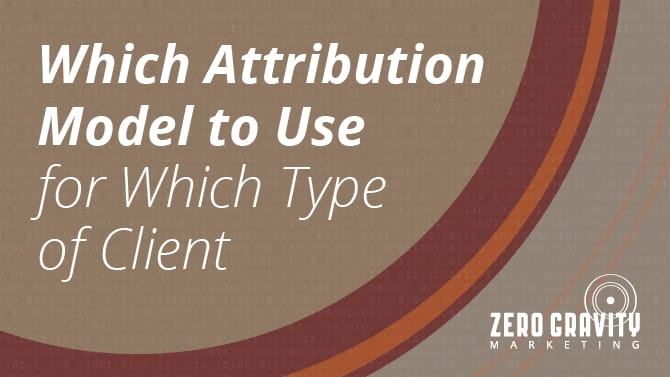The marketing field has gotten increasingly more complicated as technology has taken over our lives. Once upon a time, “marketing” was synonymous with advertising, creative thinking, idea generation, and the emotional touchy-feely side of human beings. That part has not changed. What has changed, however, is the enormous amount of data analysis, numbers, and metrics measuring that’s been added to the plates of marketing professionals.
Let’s be honest, we never heard Donald Draper utter the phrase “attribution model,” did we? This is a different world, and if you want to ensure you’re putting your words where the money is, you need to use the attribution model that’s built for your specific type of business and target industry.
How? Let’s take a look!
What Exactly is Attribution Modeling?
Attribution modeling is a very broad term for a complex process that involves critical thinking, creativity, and analytical analysis. In other words, it brings both sides of your brain together in perfect harmony. The purpose is to allow you to understand how various keywords, ad groups, and campaigns trigger relationships with your audiences. Attribution modeling gives you insights into the ways your consumers think, how they search for your product, and what processes they go through before deciding to make a purchase. Attribution models define the sets of rules that determine how credits for clicks and conversions are assigned to the various touchpoints of a customer’s journey. For example, “First Interaction model assigns 100% credit to touchpoints that initiate conversion paths.”
Mind you, the ways your audience interacts with your ads are just as unique as your business itself. That means not all attribution models are built the same, and some are better for certain industries and brands than others. Let’s investigate the various models.
Linear Attribution Model
With Linear Attribution, every touchpoint is assigned an equal amount of credit, meaning every touchpoint is considered equally as valuable in helping you transition your audience from interested spectator to paying customer. The downside of this model is that it undervalues the key touchpoints or overvalues minor ones, but when every touchpoint is important to conversions, this isn’t necessarily a huge negative.
Who It Works Well For:
- Big-brand names that are already well-established within their industries. People searching for these companies’ products likely already have an idea what they’re looking for, know the best brands in the business, and will have fewer touchpoints along their journey – meaning the credit per click makes sense on an even-distribution scale.
- Start-ups with small lead generation power also benefit from this model because they don’t yet have much of an online presence. In this scenario, it makes sense to reward every touchpoint, so you can gain insight as to your consumers’ behaviors. Once you’ve established an understanding of the way your audience works, you can always change models down the road.
Time Decay Attribution
Time Decay rewards the touchpoints closest to the conversion. This means customers may have spent weeks digging around the internet, and the initial touchpoints are less valuable than those which ultimately created the conversion.
Who It Works Well For:
- Large companies that have many campaigns. You don’t need to give every touchpoint a trophy because it’s nearly impossible to pick a winner if everything’s given credit. Give the money to the guys that got you over the finish line.
- Companies with a multitude of top- and middle-funnel campaigns do well by the decay model because they’ve already got a lot going on. It only makes sense to reward the final touchpoints.
- Large ecommerce businesses fare well in this model because their customers are constantly poking around online, looking for the best price or the optimal object. The most recent interactions should get the bid because they’re the ones that finally won them over.
Don’t worry; if you’re not at attribution model expert, you’re in good hands. Our team at Zero Gravity Marketing is a group of results-driven, marketing analytics experts who love delving deep into all things related to creating success on the internet—and that includes identifying the right attribution model to use for each of our clients’ unique businesses. We’re ready to chat when you are!






